A truly unique experience is visiting Morocco during Ramadan. Getting ready for the trip of a lifetime means learning about Ramadan and what to expect during your trip. This may seem like a scary idea to some travelers.
About Ramadan
Ramadan is considered one of the holiest months of the year for Muslims. It’s a time of immense spiritual reflection and heightened devotion, where Muslims commemorate the revelation of the Qur’an to Prophet Muhammad. This month, Muslims abstain from food, drink, and other indulgences from sunrise to sunset. This fasting serves multiple purposes: drawing closer to God, cultivating self-control, and fostering gratitude for one’s blessings. It also allows Muslims to develop empathy and compassion for those less fortunate who may struggle with hunger daily.
The holy month is a beautiful display of community spirit. Mosques hold special night prayers called Taraweeh, where large gatherings recite verses from the Qur’an. Families come together to share meals before dawn (Suhoor) and after sunset (Iftar), creating a strong sense of togetherness. It’s important to note that those who cannot fast, such as pregnant or nursing women, the sick, elderly people, and children, are exempt. Ramadan culminates in the joyous Eid al-Fitr celebration, a time for feasting, exchanging gifts, and strengthening family bonds.
When do the Moroccans eat?
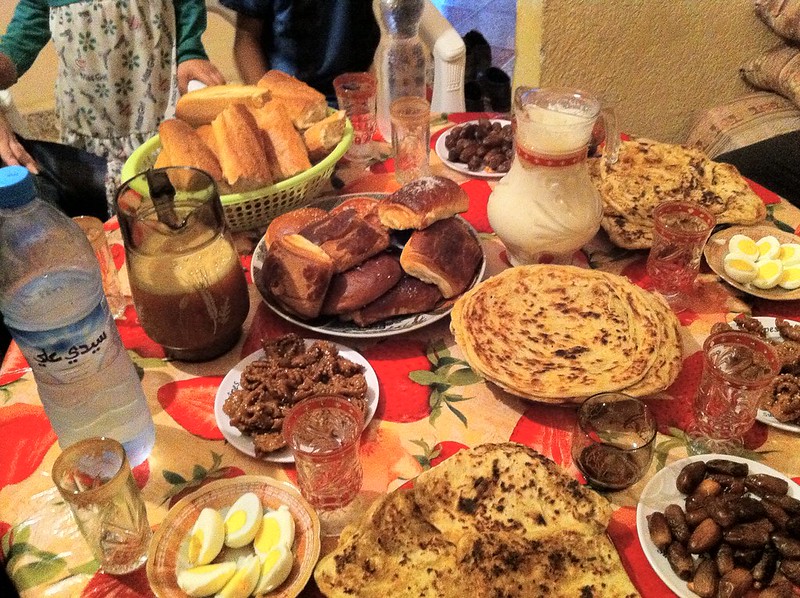
Fasting does not automatically mean less or lighter food for Moroccans; it simply means not eating during daylight hours. This shift in mealtimes creates a unique rhythm to the day in Morocco during Ramadan.
Pre-dawn Feast (Suhoor):
As the first light appears on the horizon, Moroccans rise for Suhoor, a pre-dawn meal that serves as fuel for the long day ahead. This hearty breakfast is often a spread of nourishing options like fragrant sweet porridge (Harira), fluffy Msemen flatbreads, fresh dates, and strong coffee or mint tea. Families gather around the table, sharing stories and enjoying the quiet camaraderie before the day begins.
The Wait and Anticipation:
Moroccans abstain from food and drink throughout the day. This period can be a time for self-reflection, prayer, and community service. The aroma of spices and cooking wafting from nearby kitchens might be tempting, but it only serves to heighten the anticipation for the evening’s grand meal.
Iftar:
A Celebration of Community: When the sun dips below the horizon, the joyous sounds of the cannon, or “Zouaka,” signal the breaking of the fast. Families and friends gather for Iftar, a lavish feast that is the culinary centerpiece of Ramadan. Tables overflow with steaming bowls of Harira soup, savory pastilla pastries, sweet Chebakia cookies, and mountains of fluffy bread. Moroccans relish these flavorful dishes, often accompanied by refreshing dates and glasses of cool mint tea. The Iftar meal stretches for hours, filled with laughter, conversation, and a deep sense of togetherness. Homes often welcome extended family and neighbors, creating a vibrant atmosphere of community and shared celebration.
Can tourists eat and find food during the day?
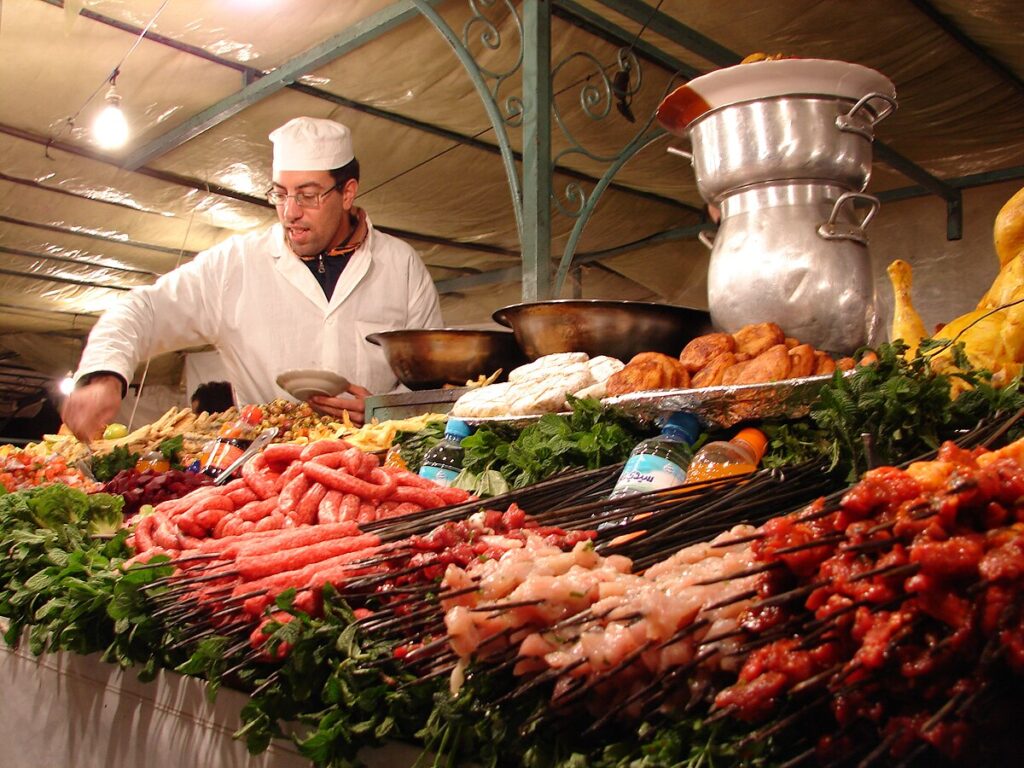
You won’t have to worry about going hungry during daylight hours in Morocco, even during Ramadan. Here’s why:
Catering to Tourists:
Many hotels and chain restaurants throughout Morocco remain open during the day throughout Ramadan. This is because tourism plays a significant role in the Moroccan economy, and these establishments cater to visitors who don’t observe the fast. So, if you’re staying at a hotel or following a tour itinerary that includes meals, you can expect to be well-fed throughout the day.
Adaptable Tour Operators:
Tour providers in Morocco are accustomed to accommodating tourists during Ramadan. If meals are included in your tour package, they’ll likely be adjusted to fit Ramadan timings. They might offer pre-dawn breakfast deliveries or packed lunches for excursions, ensuring you have sustenance during the fasting hours.
Respectful Availability:
While some smaller, more local restaurants might adjust their hours during Ramadan, there will still be options available, especially in tourist areas. The key is to be respectful and understanding if a particular eatery is closed during the day.
No Pressure to Fast:
It’s important to remember that tourists are not expected to participate in the Ramadan fast. Moroccans understand and appreciate that visitors have different religious practices. Feel free to eat and drink according to your usual routine.
Laylat al-Qadr: the 27th day of Ramadan
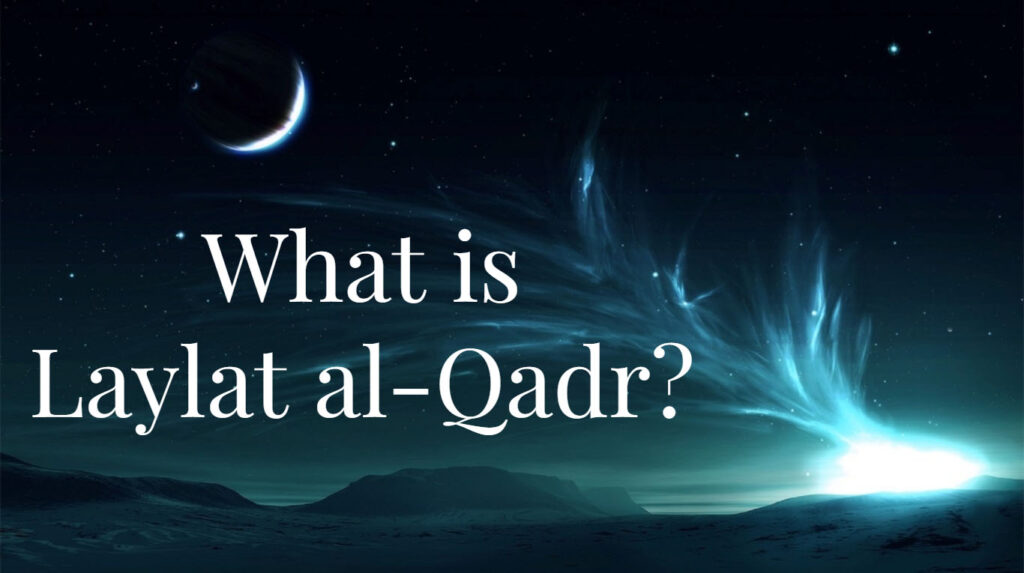
The 27th night of Ramadan, also known as Laylat al-Qadr (The Night of Power), is not just a celebration, but a night of immense spiritual significance for Muslims. It’s believed to be the night the (Quran) was first revealed to Prophet Muhammad (PBUH). This night is said to be better than a thousand months of worship, making it a time to maximize good deeds and devotion.
Family, Community, and Increased Devotion:
Families often gather for Laylat al-Qadr, but the focus shifts from exchanging gifts to spending quality time together in prayer and reflection. Many mosques hold special programs and lectures throughout the night, creating a beautiful display of unity and devotion as Muslims pray for Tarawih prayers in the congregation.
Extraordinary Practices:
One unique tradition of Laylat al-Qadr is Bkhour. Fragrant plants like frankincense or oud are burned in houses, filling the air with beautiful scents. These scents hold symbolic meaning, representing purification and spiritual cleansing for the home and its inhabitants.
Regional Traditions:
While some traditions are widespread, others vary by region. Some mosques may be decorated with special lights to create a particularly sacred atmosphere. In some areas, families prepare special meals for Suhoor (the pre-dawn meal) to mark the importance of the night.
Making the Most of Laylat al-Qadr:
Muslims strive to make the most of Laylat al-Qadr. Many stay awake throughout the night (i’tiraf) to maximize their prayers and recitation of the Quran. This is a time for increased devotion, seeking forgiveness, and reflecting on the blessings of Islam.
By planning prayers in advance, preparing your heart with intention, and focusing on good deeds, you can make Laylat al-Qadr a truly transformative night.
Eid Al Fitr
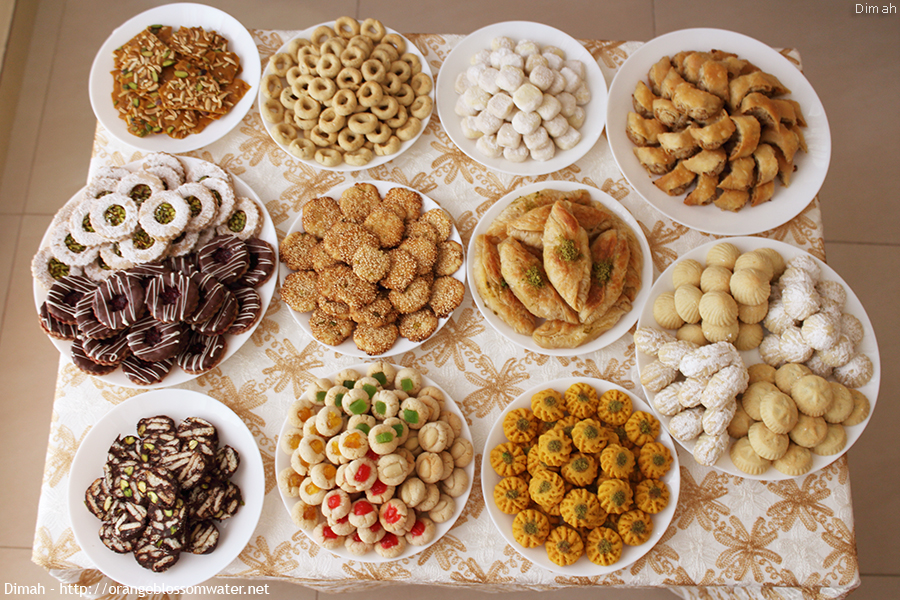
After thirty days of fasting, praying, and following all the rules, Moroccans end their spiritual journey and celebrate by breaking their fast. It’s Eid al-Fitr, a very happy and thankful time of year!
The feeling of celebration:
There is a lot of energy in the air in the weeks before Eid al-Fitr. Women decorate their homes with bright things. Walls have elaborate henna drawings on them, and colorful rugs and drapes are set up around the room. The air is sweet with the smell of traditional Moroccan treats being made, like fluffy cakes like Chebakia and Mhencha and hearty tagines that are bursting with flavor. Families are thrilled to buy new clothes, and many choose traditional jellabas with bright colors and lots of small stitching. The streets are filled with busy markets. Kids are especially happy because they get new clothes and toys as gifts.
A Day to Celebrate:
A special prayer starts on the day of Eid at dawn. Men wear their best djellabas and meet in mosques or other marked prayer places. They meet each other and wish each other well while singing happy songs of “Eid Mubarak” (Blessed Eid).
Get-togethers and feasts with family:
After the prayers, families get together for a happy party. Families are filled with warmth and laughter as friends and family who may not have seen each other during Ramadan get back together. Large feasts are an important part of the celebration. Along with tasty pastilla and cool salads, fragrant couscous dishes are served with soft meats and veggies. For the sweet ending, there is a lovely spread of homemade cookies, pastries, and cakes that are enjoyed with hot Moroccan mint tea.
Strengthening Bonds:
Eid al-Fitr isn’t just a happy holiday; it’s also a time to forgive and care for others. Old grudges are forgotten, and relationships between family and friends get stronger. People visit their friends and extended families, which spreads the Eid joy throughout the neighborhood.
This longer section catches the heart of Eid al-Fitr in Morocco by showing the joyful family meetings, preparations for the holiday, and prayers for peace and community that make this holiday unique.
Being a tourist in Morocco during Ramadan
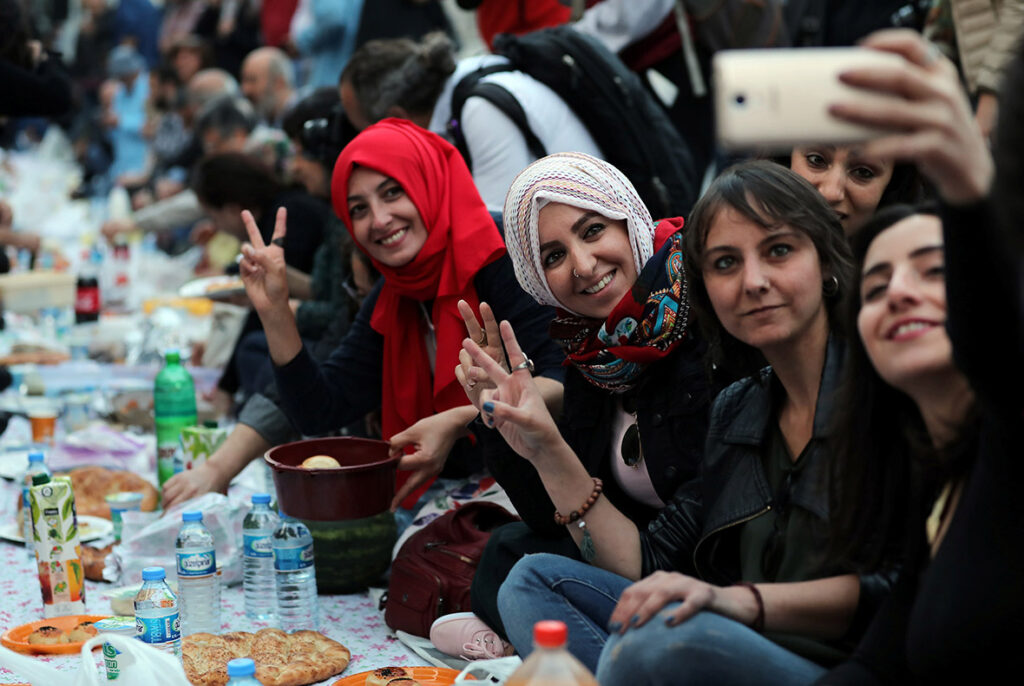
Moroccan people are renowned for their hospitality, and this is especially true during Ramadan. Tourists are not expected to conform to the fast, and in fact, many Moroccans are happy for visitors to continue their usual routines. You won’t feel pressured or uncomfortable navigating daily life during this holy month.
Welcoming Tourists to the Ramadan Experience:
Open Invitation: Moroccans often extend warm invitations to tourists to join them for Ftoor (the evening meal breaking the fast). This is a wonderful opportunity to experience Moroccan culture and traditions firsthand. Imagine the vibrant energy of a bustling family table, laden with delicious dishes and the aroma of spices filling the air. As you share stories and laughter over steaming glasses of fragrant mint tea, you’ll gain a deeper appreciation for the warmth and togetherness central to Ramadan celebrations.
Respectful Interactions:
Mindful Dress: While there’s no strict dress code for tourists, it’s always a good idea to be mindful of cultural norms. Opt for clothing that covers your shoulders and knees, especially when visiting religious sites or attending Ftoor invitations. This small gesture shows respect for the holy month.
Public Displays: During Ramadan, public displays of affection are generally discouraged. Being mindful of this practice will help ensure a smooth and respectful experience for everyone.
Will Ramadan keep Morocco busy?
Ramadan tends to be off-season for tourists, so expect to encounter fewer crowds at popular attractions and enjoy shorter wait times for activities. This translates to a more relaxed and intimate travel experience. Business as usual prevails in the tourism industry. Tour operators continue running their excursions, adventure companies maintain their activity schedules, and most historical sites, museums, and cultural centers remain open.
However, keep in mind that some shops and restaurants may have adjusted operating hours during Ramadan. They might close for lunch prayers or operate with shorter evening hours before sunset. If you’re a night owl, this can actually be a perk! Many Moroccan cities truly come alive after dark during Ramadan. Local restaurants and cafes bustling with activity offer the perfect opportunity to sample delicious traditional fare and immerse yourself in the vibrant Ramadan night culture. Expect street performers, lively music, and a festive atmosphere that can last until midnight or even later. So, if you’re looking for a unique travel experience that goes beyond the typical tourist itinerary, Ramadan might be the perfect time to visit Morocco
FAQ
Absolutely! Ramadan offers a unique cultural experience, but it’s important to be respectful of local customs.
No, tourists are not expected to fast. However, you may want to be discreet about eating and drinking in public during daylight hours.
Some shops and restaurants may have adjusted hours, especially during prayer times. However, most tourist attractions and many restaurants remain open.
If invited, you can politely accept an invitation to an Iftar (evening meal) to experience Ramadan customs.
The Night of Power (Laylat al-Qadr) is a particularly significant night. Mosques may have special decorations or programs.
Yes, supermarkets and some shops will be open, though hours might be adjusted. Stock up on snacks and drinks for the daytime if needed.
Alcohol is generally harder to find during Ramadan. Some high-end hotels may have bars, but it’s best to check their policy beforehand.

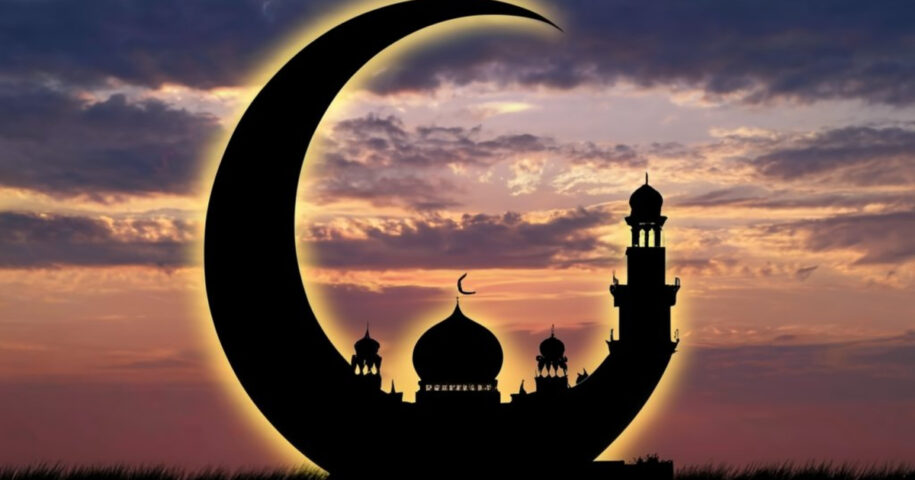
Leave a Reply